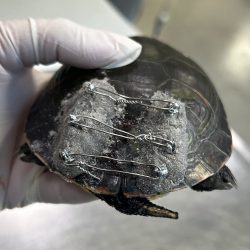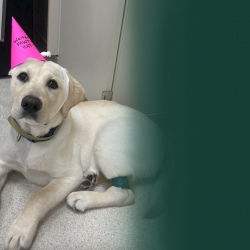Mika, a daisy dog, returns to MSU College of Veterinary Medicine as a therapy dog as part of her recovery, four years after the Veterinary Medical Center saved her life.

On a mild, sunny April day, teams of students huddle around tables in the MSU College of Veterinary Medicine’s G-Building lobby. They pore over textbooks and color-coded notes. Any chatter is subdued. Outside the sun warms the pavement and the cornhole boards waiting for students who have finished their testing—and a black and white daisy dog whose pitter-pattering little paws were on their way to deliver joy.
Mika, a therapy dog, wanders from student to student, accepting pets, and occasionally sitting in laps. Some students turn away from their work to pet her, others seek her out, following her around and chatting with Kris Chapman, Mika’s owner and handler. Not every student breaks from their studies for some chill petting time, but those interested smile when graced with Mika’s kisses.

Unbeknownst to them, Mika has visited before, under more life-threatening circumstances. In 2019, when Mika was a puppy, she was bitten by a much larger dog, resulting in two punctured lungs and three fractured ribs. Chapman recalls rushing Mika to the Michigan State University Veterinary Medical Center for emergency care. Chapman is grateful to all the Hospital staff that contributed to saving Mika’s life, and she was especially thankful for the fourth-year students assigned to assist clinicians on the case.
“The fourth-year student who stayed in touch with me and the connection she made – I knew that Mika was being watched well and cared for. She helped me get through it. Because the Hospital would have let me come up right away the next day after the incident, but they advised to let Mika rest and the ability of the fourth-year to report all that put me at ease.”

Chapman notes that Mika had always been a calm dog, however, after being attacked, Mika had to be enrolled in various classes to regain her confidence—individual training first, and then reintegrating her into group classes. “Then I decided to run her through the therapy dog prep class. All of that was in response to the injury and wanting to rebuild her confidence around people and dogs.”

Mika received her training with Carol Hein-Creger, dog trainer, and certification through Therapy Dogs International. She then passed a second test to join Buddy’s PALS, a Greater Lansing group of dogs and handlers who bring their therapy dogs to education settings in the area. The College of Veterinary Medicine is Mika’s first stop since getting her certification.
Various colleges across Michigan State’s campus began recruiting therapy dogs with increased frequency following the tragic events of February 13, 2023, to support students’ wellbeing. The College has scheduled several visits with various therapy dogs since, including Mika.
Sara Glees, the student well-being coordinator at the College, schedules the therapy dogs that visit the G-Building. “I noticed other spots on campus were bringing the dogs in. Once they were here one time, it made me want to bring them more, noticing how the students reacted to having an animal in their space that they could just sit with or talk to or play with, plus it ties into their career goals as future veterinarians and veterinary nurses, so it seemed like the perfect fit.”
Dogless Destress with Sara Glees:
Don’t have access to a therapy dog, or seeking other ways to destress and regulate your emotions? Our well-being coordinator offers alternatives:
- Go outdoors, especially if you can leave your phone inside, or off. Leave the headphones out and just be—whether you go for a walk, whether you can do some grounding, sit on the grass, take your shoes off and feel the earth. All those cheesy things can really work to bring you back to the present moment.
- Finding gratitude is also something that has been shown to decrease stress. Maybe in the moment write a few things down that you’re feeling grateful for.
Feel free to reach out to Sara Glees (sglees@msu.edu) regarding the wellness opportunities, such as wellness coaching, offered to students at the College.
Glees says that interactions with a therapy animal are shown to be grounding and help with stress management. “When they’re feeling off-center, to be able to hold an animal to reregulate emotionally, helps them to calm down.” She adds that Mika’s first visit during the exam study sessions allowed the students to take a “brain break” that they might not have recognized they needed. “You instantly get a smile from seeing a sweet or goofy dog in your space. It perks students up and gives them a little bit of life back.”
Thanks to the positive response, Glees plans to continue regular therapy dog sessions in the fall 2023 semester. “I think just the reaction that we saw over the last few months means that it’s worth the effort to have someone here, even if it’s only once a month to give students something to look forward to.”
Mika and Chapman plan to continue their visits as well. Chapman especially appreciates the calmness of bringing Mika to a college setting as opposed to a K12 setting. The students’ experience with animals doesn’t hurt either—Mika can be confident that whether she’s visiting the College or the Hospital, she is in well-trained, gentle hands.




